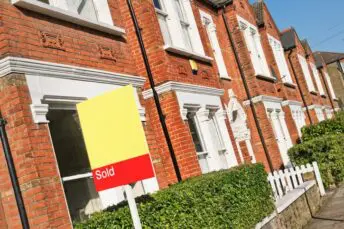
A five-year fixed rate mortgage with NO early repayment charges: Leeds BS offers a fix with flexibility – This is Money
Leeds Building Society has ditched early repayment charges on two new fixed rate mortgage deals.
It means borrowers can now lock into a fixed rate for up to half a decade without having to pay a penalty if they repay early – a rare opportunity to achieve the certainty of a fixed deal and the flexibility of unlimited over payment.
These charges are usually attached to fixed rate deals, and especially the cheaper ones where the lender wants to see the borrower commit for a few years.
They can really sting if you find yourself having to move and repay early: typical early repayment charges of 5 per cent would cost the borrower £7,500 on a £150,000 mortgage, for example.
As such, borrowers have traditionally had to choose between the security of a fixed rate mortgage or the flexibility of a variable rate.
So are the new deals from Leeds any good, and does the extra flexibility mean borrowers will end up paying more?
______________________________

Cost of living ‘outstripped house prices in 2010s’ – BBC
UK house prices rose slower than the general cost of living in the last decade, bucking the boom of the previous 10 years, research suggests.
Property values were down by 1% from the start to the end of the 2010s after taking inflation into account, the Nationwide Building Society said.
Wages were also little changed under the same measure, so there was still little to cheer for first-time buyers.
Prices rose fastest in London, outstripping inflation by 24%.
In pure cash terms, UK house prices went up by 33% during the last decade, the building society said. However, during the 2000s, prices more than doubled in cash terms.
After adjusting for the rising cost of living, as measured by inflation, prices rose by 67% during those 10 years, with the decade starting with a house price boom and ending with the financial crisis.
Jonathan Samuels, chief executive of property lender Octane Capital, said: “It is not often that you celebrate weaker growth figures, but the performance of house prices in the 2010s may be an exception to the rule. Affordability is still a major hurdle after just 33% growth, so if the trajectory of the noughties had continued, the market would have been beyond the reach of many more people.”
Find out what happened to house prices in your area with our House Price Watch.

Reallymoving: First-time buyers were driving force of the market last year – Mortgage Introducer
First-time buyers were the driving force in the property market in 2019, accounting for 55.7% of all home purchases throughout the year according to Reallymoving.
Over a fifth used a government scheme to help them buy their first home, such as shared ownership (14.6%) and Help to Buy (7.3%).
Rob Houghton, chief executive of Reallymoving, said: “First-time buyers were the driving force in the market during 2019, encouraged by cheap loans, soft house prices and plenty of government support in the shape of shared ownership and Help to Buy which remain extremely popular.
“Most home moves remained local with a remarkable 40% taking place within five miles of existing homes, suggesting that people were more motivated by extra space and more desirable properties than by major moves for new jobs or lifestyle changes.”
______________________________

Measures suggested to cut cost for leaseholders buying freehold – Your Money
The Law Commission has outlined a handful of measures which could reduce the cost for leaseholders looking to extend their lease or purchase the freehold of their homes.
The formal name for this process is enfranchisement.
The Law Commission was tasked with reviewing the enfranchisement process by the government.
It has suggested three key schemes for determining the premium ‒ the sum paid by leaseholders when enfranchising the property ‒ which will make that figure more affordable, while still ensuring landlords are paid what it classes a sufficient amount.
For example, under the current system part of the premium is calculated using the ‘marriage value’ ‒ reflecting the fact that owning the freehold outright is worth more than the sum of the freehold and leasehold interests if owned separately ‒ and the ‘hope value’, which is a deferred form of the marriage value.
The three models suggested by the Law Commission involve removing either the hope value, marriage value or both from the calculation of the enfranchisement premium.
In addition to the three reform models, the Law Commission has outlined a handful of other options for revamping the system.
Find out what these are…
______________________________








